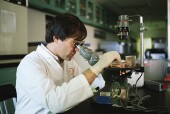| 
Transfusions of 'Older' Blood Don't Work as Well
 WEDNESDAY, March 19 (HealthDay News) -- Heart-surgery patients who get transfusions of blood that has been stored for more than 14 days do worse than those who get newer blood, a new study shows.
In-hospital death rates, incidence of complications and long-term death rates were higher for those getting older blood, conclude physicians at the Cleveland Clinic.
While other studies have shown the same effect, "we're not necessarily advocating a policy change at this time," said Dr. Colleen Gorman Koch, vice chairman of education and research at the clinic's department of cardiothoracic anesthesia.
But Koch said she and her colleagues are conducting a controlled trial that could lead to a change in the current policy of the U.S. Food and Drug Administration, which says that blood can be stored for as long as 42 days before transfusion.
The trial, which will closely track the condition of heart-surgery patients who get transfusions, will include 2,000 participants, Koch said. Fewer than 100 have been enrolled so far, and results are not expected for at least two years, she said.
The newly reported study, published in the March 20 issue of the New England Journal of Medicine, examined almost 2,900 people who underwent coronary artery bypass procedures or heart valve operations and who got blood that had been stored for 14 days or less. They were compared with more than 3,100 people undergoing those procedures who got blood that had been stored for at least 14 days.
The study found that 2.8 percent of those getting older blood died in the hospital, compared to 1.7 percent of those getting fresher blood. The incidence of infection among the older-blood group was 4.0 percent, compared to 2.8 percent in the fresh-blood group. And in the year following the transfusions, 11.0 percent of those getting older blood died, compared to 7.4 percent of those getting newer blood.
"It's nice to know that other people are coming around to the same conclusion as we did," said Dr. Sunil Rao, assistant professor of medicine at Duke University Medical Center's Division of Cardiology, who worked with Dr. Jonathan Stamler at Duke on a series of studies showing adverse effects of older blood.
"The biggest impact of a paper like this is that it is really a call to arms, coming from a well-established institute with some of the best cardiac surgery in the world," Rao said.
The Duke studies have shown that "blood undergoes changes profoundly, even in the first 24 hours," Rao said. The major effect is loss of nitric oxide, "which is really fundamental to the process of oxygen exchange," he said.
The Duke researchers are trying to get funding for a study in which nitric oxide would be added to transfused blood, to see whether that offers benefits over the long run, he said. "It needs to be tested in studies long enough to improve survival and outcome," Rao said.
While the various studies are considered and conducted, practical steps can be taken to reduce the need for transfusions, Koch said. Patients should be tested before surgery to determine if their hematocrit -- a measure of possible anemia -- is low enough to cause worry. "If there is anemia, you should find the source of it and treat it," she said.
The Cleveland Clinic is also using medication that decreases bleeding, and even gathers red cells that are washed and restored to the patient's body, she said.
More information
To learn more about transfusions and blood donations, visit the U.S. National Library of Medicine.
|  |

Happiness Is in the Genes
 FRIDAY, March 7 (HealthDay News) -- The right genetic mix might lead to a lifetime of happiness, a new British study suggests.
"While it was known that around half the differences in happiness are related to genes, what we found was that those happiness-related genes are genes for personality, namely for being extroverted, emotionally stable and conscientious," said co-researcher Tim Bates, from the School of Philosophy, Psychology and Language Sciences at the University of Edinburgh.
Because personality is relatively stable, this new research helps solve what was otherwise a real puzzle, namely why people tend to show stable differences in happiness, Bates said.
"It turns out that if we want to understand happiness, we will need to understand personality," Bates said. "An important implication is that personality traits of being outgoing, calm and reliable provide a resource, we called it affective reserve, that drives future happiness," he said.
In the study, Bates' team collected personality and happiness information on 973 twin pairs. The researchers were able to identify evidence for genes tied to certain personality traits and genes that predispose people to happiness.
The researchers found that people who don't worry excessively and are sociable and conscientious tend to be happier, according to the report in the March issue of Psychological Science.
While happiness has a genetic component, about 50 percent of the difference in happiness between people results from relationships, physical health, and careers, Bates noted.
However, those lucky enough to have the right gene mix appear to have an extra supply of happiness that they can use when times are tough, the researchers reported.
"If people want to raise their own levels of well-being, our best advice is that they practice the kinds of behaviors that characterize calm, conscientious, extroverts," Bates said.
"Try and be active and social, even if with just a few people. Practice the things you find emotionally challenging, maybe even keeping a diary to help you keep a sense of reality, and allow you to reflect on which strategies work, and which do not. Then set yourself small achievable goals, and work at them. Count your blessings -- that's reflecting on what works in your life -- keep a sense of humility and work for those things you really want," he said.
One expert thinks the study contributes to the understanding of happiness, because it shows that happiness and personality share some of the same genes.
The results of this study are consistent with previous research on the genetic roots of happiness, which has shown that approximately 50 percent of the variance in individual differences in happiness is determined by genes," said Sonja Lyubomirsky, a professor of psychology at the University of California, Riverside.
The unique contribution of this study is the finding that happiness appears to have the same genetic roots as personality -- both share genes, Lyubomirsky said. "This is intriguing, as we previously really didn't know what the genetic component of happiness really represented," she said.
More information
For more on personality, visit the American Psychological Association  . .
|  |

Physicians Say They Need More Sleep
 FRIDAY, March 7 (HealthDay News) -- American doctors aren't getting the amount of sleep they need to function at their best, and work schedules may be one of the reasons for that lack of sleep, a new analysis suggests.
An Internet survey of 581 doctors found that the physicians reported sleeping an average of 6.5 hours a night during their work week, but most said they needed at least 7 hours of sleep a night. The doctors said they made up for lost sleep on weekends or on days off by sleeping an average of 7.5 hours a night.
Other findings from the survey, released this week by the American College of Chest Physicians Sleep Institute:
- 43.1 percent of respondents said their current work schedule didn't allow time for adequate sleep.
- Respondents rarely reported insomnia or difficulty getting to sleep or maintaining sleep, but 21.8 percent said that, at least a few times a week, they didn't feel refreshed when they woke up in the morning.
- The doctors reported more caffeine consumption than the general population -- 93 percent of them reported having at least one caffeinated beverage a day, compared with 81 percent of the general population. Most doctors said they used caffeine out of habit, rather than to help boost wakefulness.
"Call hours during training and in the practice of medicine desensitize physicians to the importance of sleep. The pervasive message is that sleep is optional or dispensable," Dr. Barbara Phillips, chair of the ACCP Sleep Institute, said in a prepared statement. "Self-sacrifice also may be seen as part of the lifestyle. This may impact physicians' awareness of their own, and their patients', sleep deprivation lifestyles."
"The upside of chronic self-imposed sleep deprivation is that it essentially eliminates insomnia complaints," Phillips noted. "Although adequate sleep is important, too much time in bed is a common finding among insomniacs; the lack of insomnia complaints among physicians probably relates to the chronic, low-level sleep deprivation that many experience."
The survey also found that 83.6 percent of the doctors reported being in very good or excellent health, compared with 56 percent of the general population.
"Although physician sleep habits may not be ideal, physicians understand the relationship between behavior and health. Physicians are less likely to smoke, to be obese, or to be sedentary, which are all lifestyle factors that can have a negative impact on overall health," Dr. Rochelle Goldberg, of the ACCP Sleep Institute steering committee, said in a prepared statement.
More information
The National Sleep Foundation has more about sleep  . .
|  |

Naturally Occurring Bacteria Cut Kidney Stone Recurrence

WEDNESDAY, March 5 (HealthDay News) -- A naturally occurring type of bacteria called Oxalobacter formigenes reduces the risk of recurrent kidney stones by about 70 percent, a new study says.
The study looked at 247 adults with recurrent calcium oxalate (CaOx) kidney stones and compared them to a control group of 259 adults. The researchers collected health and dietary information from all the participants and analyzed stool sample cultures to look for the presence of O. formigenes.
It was detected in 17 percent of people with recurrent kidney stones and in 38 percent of those in the control group.
"We observed a strong inverse association between colonization with O. formigenes and recurrent CaOx kidney stones, with a 70 percent reduction in overall risk," lead researcher David Kaufman, a professor of epidemiology at Boston University School of Public Health, said in a prepared statement.
"Our findings are of potential clinical importance. The possibility of using the bacterium as a probiotic is currently in the early stages of investigation," he said.
The study was published in the March issue of the Journal of the American Society of Nephrology.
In the United States, a person's lifetime risk of developing kidney stones is 5 percent to 15 percent, and the five-year risk of recurrence is 30 percent to 50 percent. Kidney stone-related hospital admissions cost $2 billion a year, according to background information in the study.
Up to 80 percent of kidney stones are predominately composed of CaOx, and urinary oxalate is a major risk factor for CaOx kidney stone formation, the researchers said. O. formigenes, which is present in a large number of adults, metabolizes oxalate in the intestinal tract.
More information
The National Kidney Foundation has more about kidney stones  . .
|  |
|